#devon price
Text
List of Traits that are Common Amongst Autistic People
i compiled a list of traits, symptoms, behaviors, etc (largely sourced from the book "Unmasking Autism" by Devon Price) that occur in autistic ppl at high rates. it's crazy how many of these i identify with. i think having them all in one place may be helpful to some people.
List:
-Substance abuse & addiction
-Eating disorders
-Rejection sensitivity
-Digestive issues
-Sleeping disorders
-Depression
-Anxiety
-Social anxiety
-Eczema
-Dyslexia
-Dissociation
-People pleasing
-Personality disorders
-Audio processing problems
-Joint issues
-Issues with coordination
-Stimming
-Executive dysfunction
-OCD
-ADHD
-Gender dysphoria
-Difficulty with emotional regulation
-Frequent crying or never crying
-Hyperfixations
-Sensory issues
-Sensory overload
-Extreme burnout
-Safe foods
-Safe / comfort items
-Self harming behaviors
-Difficulty regulating noise level
-Being non binary / gender nonconforming
-Difficulty understanding people's intentions / feelings when communicating
-Melt downs / break downs
-Shut downs (akin to dissociation)
-Nonverbal (completely/ partially)
-Diluted sense of identity
-Paranoia
-Catering and changing personality/ behavior to match a social setting (form of masking)
-Studying and analyzing social behavior to mimic it / understand how people are feeling
-Hypervigilance
-Insecure attachments
-Fear of vulnerability
-Prone to abusive relationships
-Special interests
-Rigid schedules
-Difficulty dealing with change in plans
-Sensory seeking / sensory avoidant behaviors
Following are quoted directly from "Unmasking Autism" by Devon Price
-Intense studying of a new favorite topic
-Needing to know exactly what to expect before entering an unfamiliar situation
-Not noticing sounds or social signals when focusing on an engrossing task
-Sticking to a very rigid schedule, and rejecting deviations to that schedule
-Taking a long time to think before responding to a complex question
-Spending hours or days alone sleeping and recharging after a socially demanding event or stressful project
-Needing “all the information” before coming to a decision
-Not knowing how they feel, or needing a few days to figure out how they feel about something
-Needing a rule or instruction to “make sense” before they can follow it
-Not putting energy toward expectations that seem unfair or arbitrary, such as wearing makeup or elaborate grooming
#autism#actually autistic#autistic adult#autistic#autistic things#unmasking autism#actually neurodivergent#neurodiverse#neurodiversity#neurodiverse stuff#devon price#unmasking autism by devon price#on the spectrum#asd#autism spectrum disorder
185 notes
·
View notes
Text
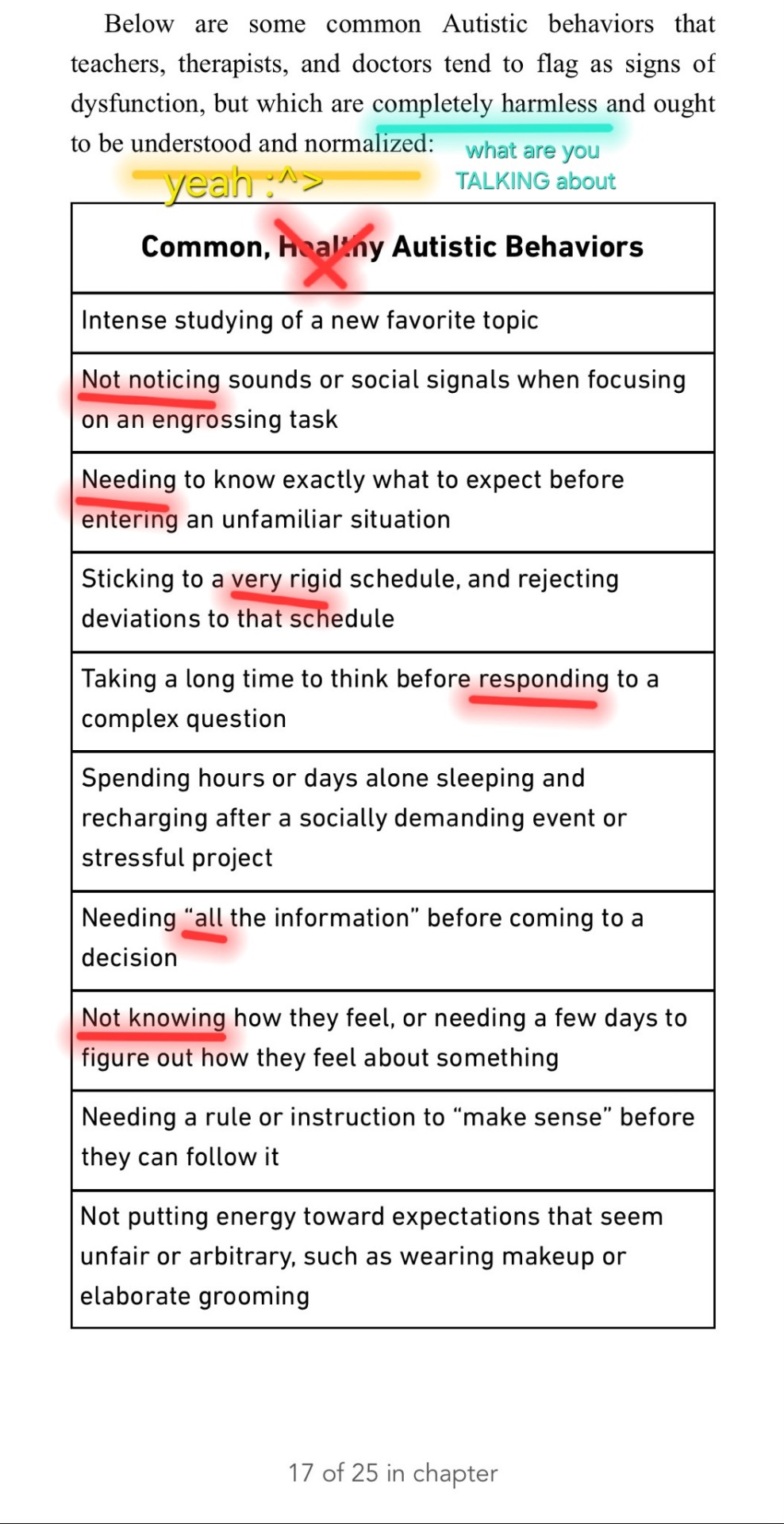
This page from Unmasking Autism by Dr. Devon Price is a great example of why I can't stand Price's writing. Validating autistic existence (and complaining about how autistic behavior gets pathologized) is eminently possible without lying/swinging hard into the opposite absolutes.
Not only does he say "completely harmless" about behaviors that have readily identified harms, he labels common autistic behaviors (which should absolutely be understood, & contextualized as part of human experience) as "healthy", which at its most innocuous is saying that these behaviors are present in otherwise unremarkable autistic people but which I interpret to mean he believes these are *necessarily euadaptive* behaviors. The absolutism of "complete[ness]" and necessity has no place in serious writing about psychology.
Anyway that's the point I wanted to make, but here are some specifics about how these normal and understandable behaviors (many of which I exhibit) aren't harmless:
1) Not noticing surroundings can be super dangerous! Not noticing that people are trying to talk to you is mildly inconvenient (which is a harm)!
2) *Needing* to know what to expect implies that being thrust into an unfamiliar situation w/o information causes distress irrespective of the actual contents of the situation. That's a harm (despite merely being an extreme version of a universal part of human experience)!
3) The more rigid a structure is, the more catastrophically and frequently it breaks. Rejecting deviations often means rejecting necessary activities like eating, or like leaving a dangerous situation.
4) Taking a long time to fully respond to a question is fine. Giving no sign that you're considering — or have even heard — the question is distressing to yr conversational partner. I highly recommend going "hmm" or cocking yr head to the side when you think about things, if this is true of you.
5) Taking information into consideration is a healthy behavior. It is physically impossible to know literally all information about a decision. Depending on your definition of "all", this behavior may lead to spinning your mental wheels while never making an actual decision, which mad sucks to experience and to cooperate with.
6) Alexithymia (i.e. not knowing how you feel) also sucks to experience! Just because you can't name or even identify the existence of a feeling doesn't mean you don't have it! Like the other behaviors I've mentioned, alexithymia has no inherent moral weight.
Anyway! I love being autistic, and wouldn't choose otherwise even if I could, but some parts of it are maladaptive even when the only other people you interact with are also autistic, and I wish Dr Price would acknowledge that.
#autism#devon price#unmasking autism#actuallyautistic#please sir i am begging you for a crumb of nuance
71 notes
·
View notes
Text
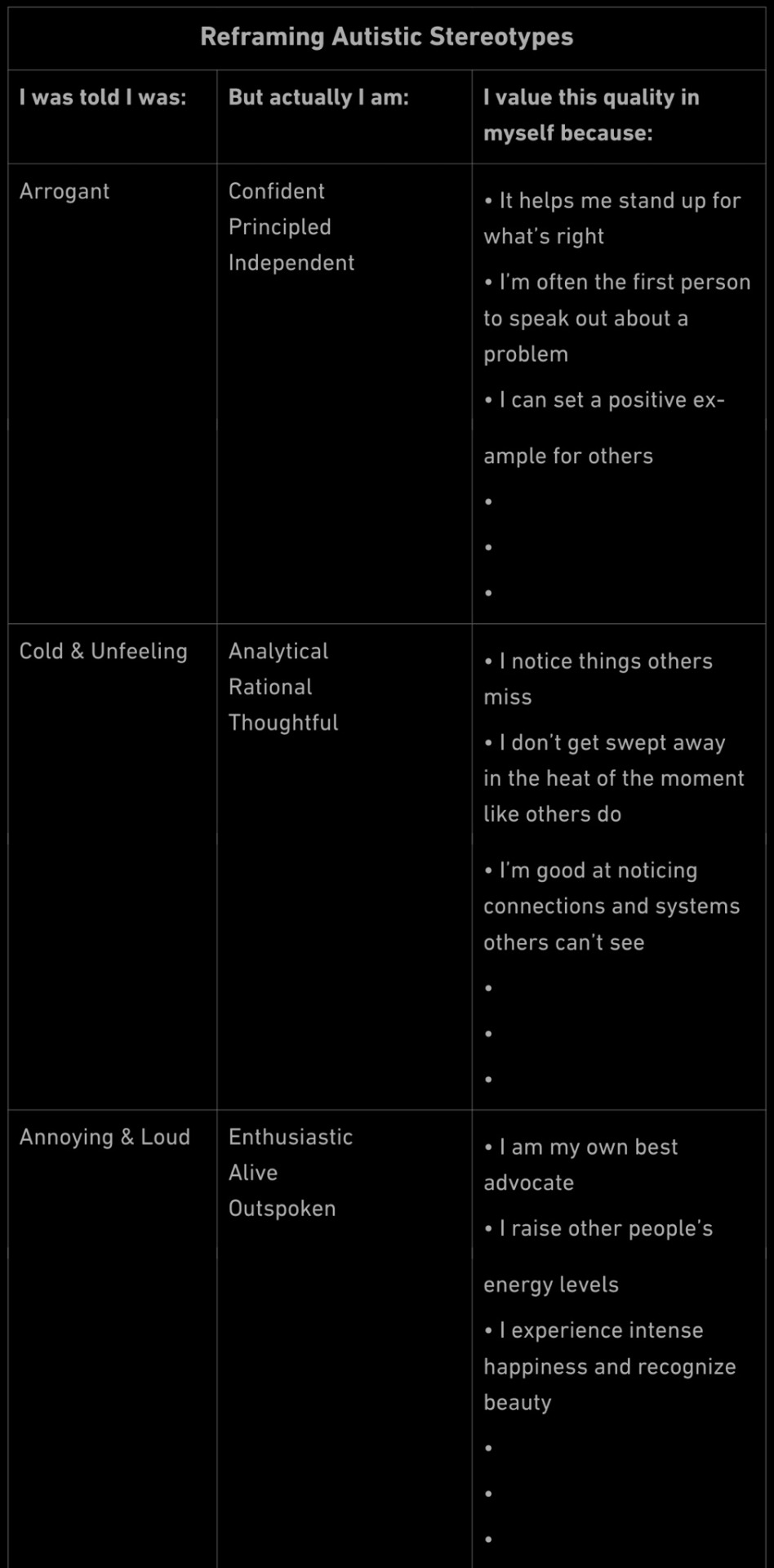


— Unmasking Autism, Devon Price
click here for access to these worksheets
444 notes
·
View notes
Quote
To call the stealthy, more socially camouflaged form of Autism a "female" version of the disorder is to indicate that masking is a phenomenon of gender, or even of assigned sex at birth, rather than a much broader phenomenon of social exclusion. Women don't have "milder" Autism because of their biology; people who are marginalized have their Autism ignored because of their peripheral status in society.
Unmasking Autism. Devon Price, PhD (Pg. 8)
765 notes
·
View notes
Text
Hi yes you should read Dr. Devon Price's new book Unlearning Shame when it comes out in February.
I put a long review on goodreads but basically what Tumblr will care about is:
we are all victims of a system that is built around shaming us for needing help and not being perfectly self sufficient (and not fitting into the norm) and the only way to change things is to stop shaming individuals for their "failings" and recognize that we're all just creatures and experience and promote acceptance of yourself and forgiveness of others
(i am REALLY summarizing please read Price's actual words he is much better than this one paragraph at explaining this and leading the reader nicely to unlearning shame of your own and the shame you project on others)
#just finished reading it#what a fucking necessary read for the tumblr population#so many things that i'm like... well fuck yeah i did / do that without ever really thinking about it#genuinely such a useful read to like#reframe some things that i knew i was thinking about in the wrong way but it's sometimes so hard not to blame#but it's so ridiculous#we're all victims of a system and putting shame on individuals isn't going to help anyone#i will reread this book a few more times and i'll be getting a physical copy as soon as i can as i did with his other books#devon price#unlearning shame
117 notes
·
View notes
Text
"I can't tell you how many times I've heard an Autistic person say they wish they could just be a floating brain in a jar, or a dark, sentient mist with no physical form."
Devon Price, Unmasking Autism: Discovering the New Faces of Neurodiversity
#best sentence in this book so far for sure#reminds me of the onion article about how 96% of adults want to be animatronic bears#unmasking autism#devon price
96 notes
·
View notes
Quote
For years now, psychologists and psychiatrists have discussed the existence of 'female Autism,' a supposed subtype that can look a lot milder and socially appropriate than 'male' Autism does. People with so-called 'female Autism' may be able to make eye contact, carry on a conversation, or hide their tics and sensory sensitivities. They might spend the first few decades of their lives with no idea they’re Autistic at all, believing instead that they’re just shy, or highly sensitive.
[...]
There’s a significant problem with the concept of 'female Autism,' though. It’s a label that doesn’t properly account for why some Autistics mask their Autistic qualities, or have their needs ignored for years.
[...]
Autistic women aren’t overlooked because their 'symptoms' are milder. Even women with really classically Autistic behaviors may elude diagnoses for years, simply because they are women and their experiences are taken less seriously by professionals than a man’s would be. Additionally, not everyone who has their Autism ignored and downplayed is a female. Many men and nonbinary people have our Autism erased, too. To call the stealthy, more socially camouflaged form of Autism a 'female' version of the disorder is to indicate that masking is a phenomenon of gender, or even of assigned sex at birth, rather than a much broader phenomenon of social exclusion. Women don’t have 'milder' Autism because of their biology; people who are marginalized have their Autism ignored because of their peripheral status in society.
Devon Price, Unmasking Autism, [Introduction]
488 notes
·
View notes
Text
Unmasking Autism by Devon Price is literally saving my life right now, every single person who is neurodivergent or even thinks they might potentially be autistic shoukd really read this. I cannot recommend it enough.
44 notes
·
View notes
Text
I'm doing a presentation (an introduction for a book at book club) tomorrow at work and while I'm slightly nervous, I'm also HELLA excited because the book is Unmasking Autism by Dr. Devon Price and I am AUTISTIC AND LEADING IT so you KNOW it's gonna be hella good and not led by an allistic person who doesn'thave hands this deep in the community.
AND THE SLIDES ARE RAINBOW AND SUPER GAY (but I also picked them because of the Neurodivergence/Autism rainbow infinity symbol)!
I AM HECKIN EXCITED BUT I GOTTA FINISH IT AHAHAHA (yay ALSO adhd lmfao)
11 notes
·
View notes
Text
Unmasking Autism by Devon Price

Have you, a friend or family member been living with undiagnosed autism?
For every visibly Autistic person you meet, there are countless 'masked' people who pass as neurotypical. They don't fit the stereotypical mould of Autism and are often forced by necessity to mask who they are, spending their entire lives trying to hide their Autistic traits. In particular, there is evidence that Autism remains significantly undiagnosed in women, people of colour, trans and gender non-conforming people, many of whom are only now starting to recognise those traits later in life.
Blending cutting-edge research, personal insights and practical exercises for self-expression, Dr Devon Price examines the phenomenon of 'masking', making a passionate argument for radical authenticity and non-conformity. A powerful call for change, Unmasking Autism gifts its readers with the tools to uncover their true selves and build a new society - one where everyone can thrive on their own terms.
#unmasking autism#devon price#transmasc#trans book of the day#trans books#queer books#bookblr#booklr
21 notes
·
View notes
Text
Unmasking Autism (Devon Price, 2022)
"Autistic people find it rejuvenating and stimulating to spend time learning about our special interests.
In studies that examine the lives of Autistic adults, engaging with special interests is positively associated with subjective well-being.
When we get to appreciate our hyperfixations, we feel happier and more satisfied with life.
But for a long time, neurotypical researchers viewed special interests as an impediment to having a “regular” life.
ABA therapists penalize Autistic children for speaking about them, withdrawing attention and affection when the subjects come up.
This trains Autistic kids to hide their deepest joys, and avoid cultivating their passions.
Punishing Autistic children for talking about their special interests is perhaps the most arbitrarily cruel element of ABA therapy. (…)
People who routinely complete eighty-hour workweeks aren’t penalized for being obsessive or hyperfixated; they’re celebrated for their diligence.
If an adult fills their evenings after work learning to code or creating jewelry that they sell on Etsy, they’re seen as enterprising.
But if someone instead devotes their free time to something that gives them pleasure but doesn’t financially benefit anyone, it’s seen as frivolous or embarrassing, even selfish.
In this instance, it’s clear that the punishing rules imposed on Autistic children reflect a much broader societal issue: pleasure and nonproductive, playful time are not valued, and when someone is passionate about the “wrong” things, that passion is discouraged because it presents a distraction from work and other “respectable” responsibilities.
The mental health costs of preventing Autistic children from enjoying their special interests are immense.
Having the freedom to develop and express special interests is linked to improved social, emotional, and even fine motor development.
A survey of Autistic young adults by Teti and colleagues (2016) found that many use their special interests to develop emotional awareness skills and coping strategies.
This frequently plays out in fandoms and nerdy communities, where neurodiverse people with mutual special interests find one another, socialize, and sometimes begin to unmask.
In a study of internet habits, researchers Johnson and Caldwell- Harris (2012) found that Autistic adults actually had a greater variety of interests and more numerous interests than their non-Autistic peers, and made far more social media posts about their interest that were designed to provoke conversation, compared to neurotypical people.
Autistic people are also a foundational part of most fandoms and conventions centered around shared hobbies—we devote a lot of energy to finding and creating spaces where we can interact with people who share our interests, and within nerdy fandom spaces, social norms tend to be more forgiving and relaxed.
It turns out that special interests aid us in becoming more outgoing, well-rounded individuals."
#unmasking autism#devon price#book#autism#disappointed that this doesn't#mention tumblr directly lol
36 notes
·
View notes
Text
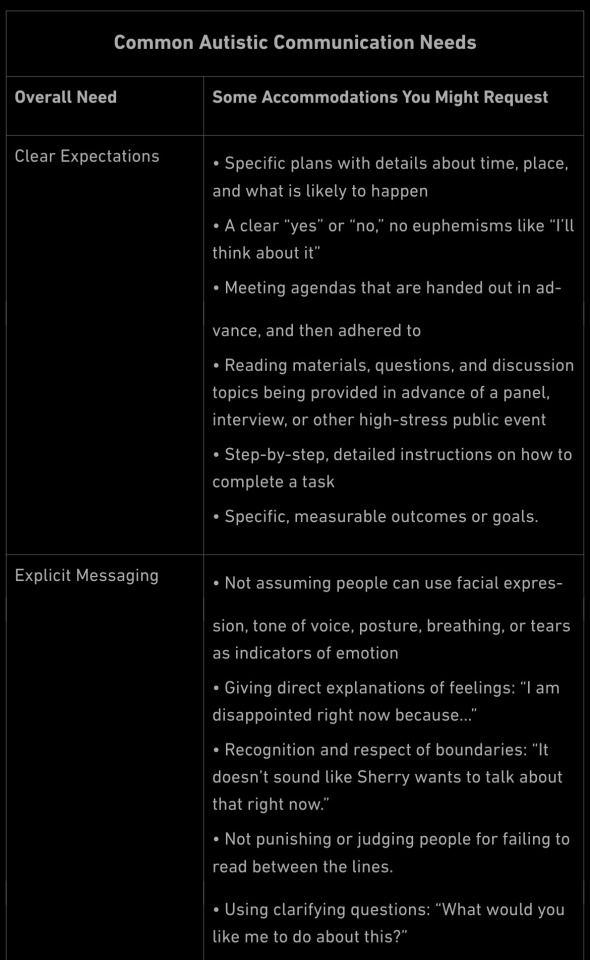
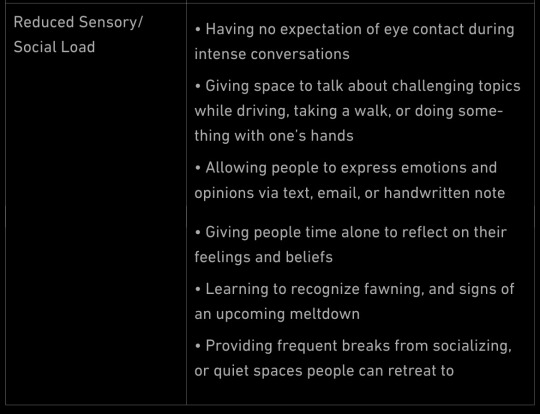
— Unmasking Autism, Devon Price
171 notes
·
View notes
Quote
Refusing to perform neurotypicality is a revolutionary act of disability justice.
Devon Price, PHD; Unmasking Autism page 11
79 notes
·
View notes
Text



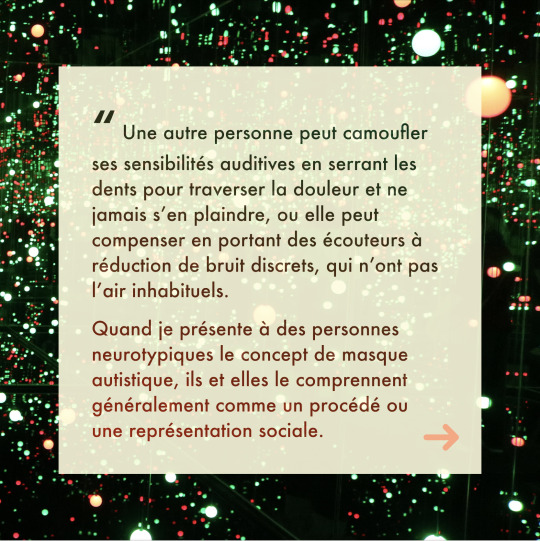

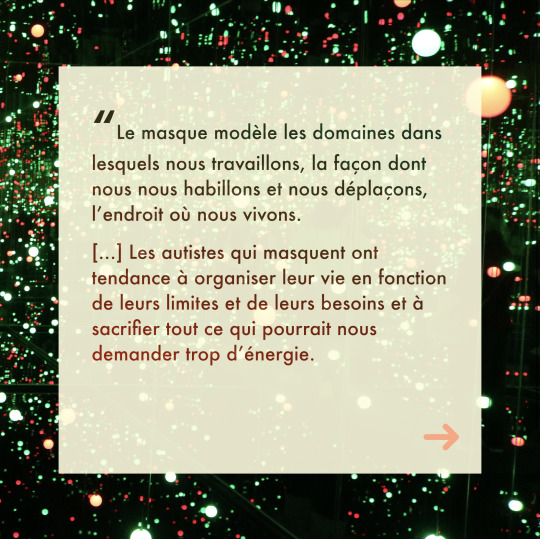
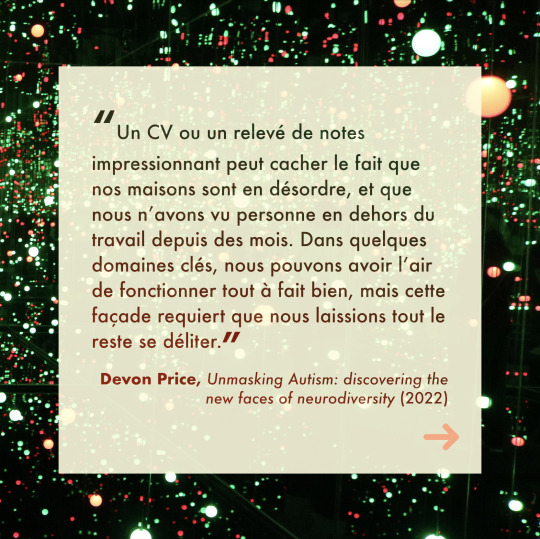
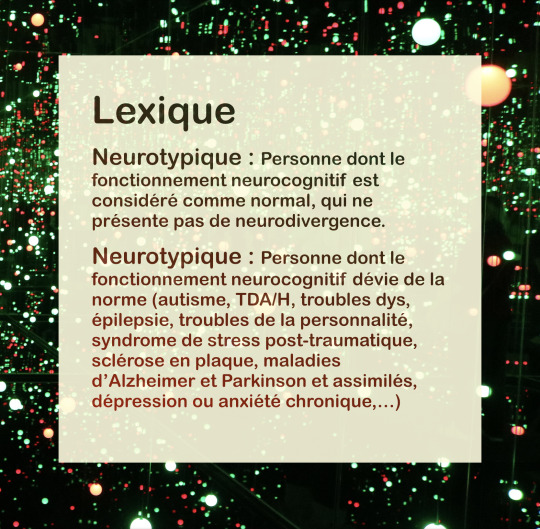
I’ve been reading Dr Devon Price’s Unmasking Autism (2022), and I wish the people I’m closed to could read it… Most of them can’t read a whole book in English though, so I have decided to translate some parts of it into French.
#actually autistic#autisme#unmasking autism#devon price#with a french translation#autistic masking#masking#neurotypique#neurodivergent
10 notes
·
View notes
Text

unintentionally hilarious ebay basket
#but if I'M autistic and the PHANTOM is autistic then WHO'S driving the boat#phantom of the opera#the phantom of the opera#phantom#unmasking autism#gaston leroux#susan kay#devon price#loud text in tags /#caps in tags /#money /#hyperfixation /
33 notes
·
View notes
Quote
I prefer the terms self-determination or self-realization to self-diagnosis, because I believe it's more sensible to view Autistic identity through a social lens than a strictly medical one. Diagnosis is a gatekeeping process, and it slams its heavy bars in the face of anyone who is too poor, too busy, too Black, too feminine, too queer, and too gender nonconforming, among others. The Autistics who lack access to fair diagnoses need solidarity and justice the most desperately out of all of us, and we can't just shut them out.
Unmasking Autism. Devon Price, PhD (Pg. 44)
112 notes
·
View notes